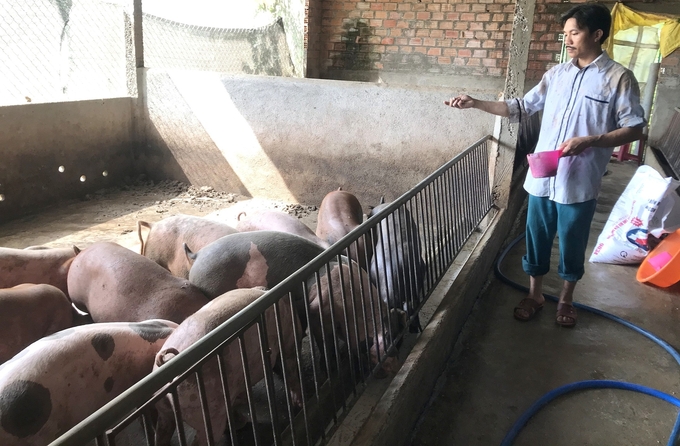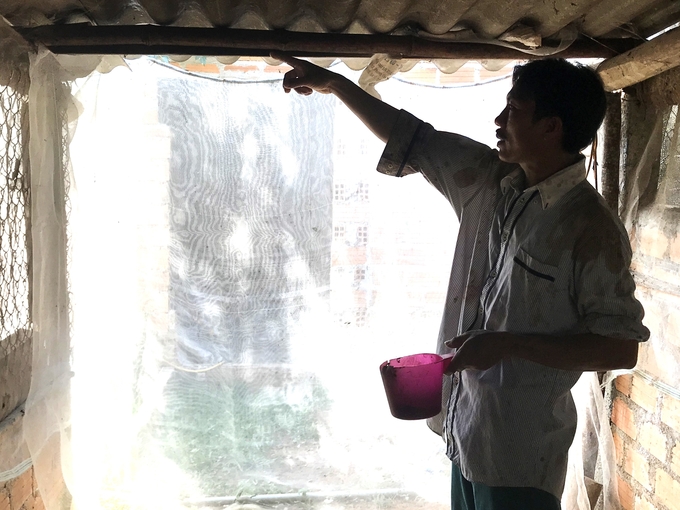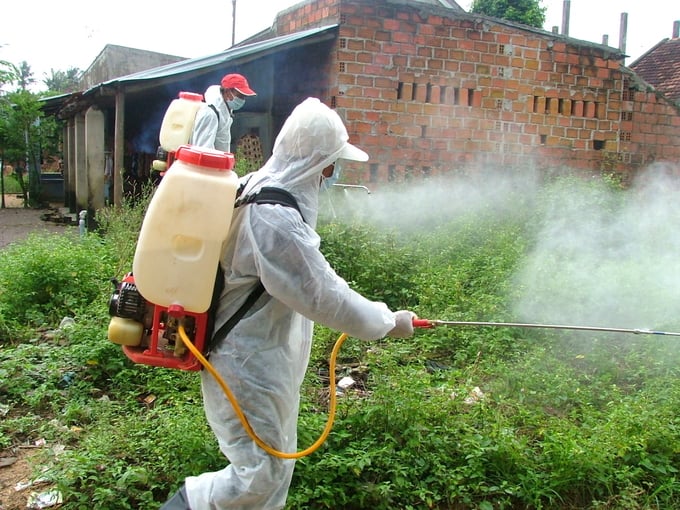May 18, 2025 | 15:41 GMT +7
May 18, 2025 | 15:41 GMT +7
Hotline: 0913.378.918
May 18, 2025 | 15:41 GMT +7
Hotline: 0913.378.918

Nguyen Van Binh's pig barn in An Duc commune (Hoai An district, Binh Dinh) is quite shabby, so he implements some bio-safe solutions to protect the pigs from African swine fever. Photo: V.D.T.
According to Huynh Ngoc Diep, Director of Binh Dinh Sub-department of Livestock Production and Animal Health, in the context of African swine fever rampaging in many localities this year, the province's pig herd of nearly 1 million was able to escape its influence, thanks to farmers implementing bio-safe solutions.
Diep believes that the African swine fever virus persistently exists in the environment, so there remains the possibility of an outbreak. But if farmers apply biosecurity standards in livestock farming, they can effectively prevent this disease.
“As a viral disease, it is hard to detect the development of African swine fever. Regarding disease prevention work, Binh Dinh’s veterinary industry guides farmers to promote bio-safe methods in livestock farming, for example, performing full vaccination against classical cholera, foot-and-mouth disease, and pasteurellosis. The caring stage for pigs will be paid additional attention to improve their resistance enough to counter the infectious nature of the African swine fever virus," said Director Huynh Ngoc Diep.
Strictly controlling the access of people going to the livestock area while regularly cleaning and disinfecting the barn can also effectively present a viral disease like African swine fever. After selling pigs, farmers can take caution by pouring gasoline on the floor of the barn to create a fire for disinfection or pouring boiling water over the floor to kill bacteria and ensure the farming environment.

Nguyen Van Binh's pig barn is surrounded by nets to prevent flies and mosquitoes carrying the African swine fever virus from entering the barn. Photo: V.D.T.
Effective folk disease prevention methods
Nguyen Van Binh has more than 10 years of experience raising pigs in An Duc commune (Hoai An district, Binh Dinh). His barn always has more than 100 pigs of all ages. Binh raises 6 breeding sows to be proactive in terms of breed sources.
Because his family does not have the means, the pig farm is quite shabby. Behind the house, Binh builds two rows of barns, using the normal structure like other livestock farmers in the area.
One thing to note is that since he started this pig farming profession, his pigs have never been infected with African swine fever. At one point, all of the pig farms in the village get sick, only Binh’s farm is “immune”.
“Since my pig barn is not a closed model, I need to be careful to prevent the African swine fever virus from entering. I regularly disinfect the barn and the surrounding area. Along with restricting outsiders from entering the barn, I set up many layers of nets in case insects from outside carry viruses into the barn,” Binh said.

Disinfecting the barn regularly is one of the solutions to prevent diseases for pigs. Photo: V.D.T.
In particular, traders who come to buy pigs have to disinfect their bodies and change their footwear before entering the farming area. Even the baskets and trucks carrying the pigs are thoroughly disinfected.
Binh arranges the pig-weighing area far away from the barn. “After selling the pigs, I immediately disinfected the trading area, boiled water and splashed it all over the floor to kill the virus, then released a new batch of pig breeds to continue raising. As a result, for many years my pigs have not been harmed by African swine fever”.
According to Nguyen Van Tuc, Deputy Head of the Office of Agriculture and Rural Development of Hoai An district, this locality regularly maintains a herd of no less than 300,000 pigs. Since 2021, farmers here have been able to escape the horror of African swine fever, raising pigs with peace of mind.
"Local authorities have put in great efforts to raise farmers’ awareness. Now they are very compliant with biosecurity requirements and regularly disinfect their barns. After covering the barn with a net system, they spray lime powder around the barn and outside the net once a week. Thanks to the epidemic in the area being under control in recent years, even though pork prices are low at the moment, farmers still boldly restock to prepare for the upcoming Lunar New Year,” said Deputy Head Nguyen Van Tuc.
Translated by Samuel Pham

(VAN) 14 out of 35 domesticated elephants in Dak Lak province have had their living conditions improved, with 11 of them currently participating in the non-riding elephant tourism model.

(VAN) Muong Nhe Nature Reserve hopes that being upgraded to a national park will lay the foundation for forest protection efforts to be carried out in a systematic, modern, and sustainable manner.
/2025/05/16/3923-2-171845_52.jpg)
(VAN) Lower costs, higher yields, and improved soil quality are outstanding benefits that soybeans bring when integrated into the crop rotation system.

(VAN) The 'For a Green National Environment' programme aims to promote a green lifestyle, support businesses in implementing ESG practices, and turn Net Zero commitments into concrete actions.

(VAN) Cold-barn systems efficiently manage environmental and temperature conditions, which aids in the prevention of respiratory diseases in pigs and protects them from the vectors that transmit African swine fevers.

(VAN) To tackle challenges, the project 'Addressing key technical bottlenecks in the grouper supply chain in Vietnam' has been underway since 2024.

(VAN) The project 'Disease-Resilient and Sustainable Cassava Production Systems in the Mekong Region', funded by the Australian Center for International Agricultural Research (ACIAR), is being implemented from 2024 to 2028.